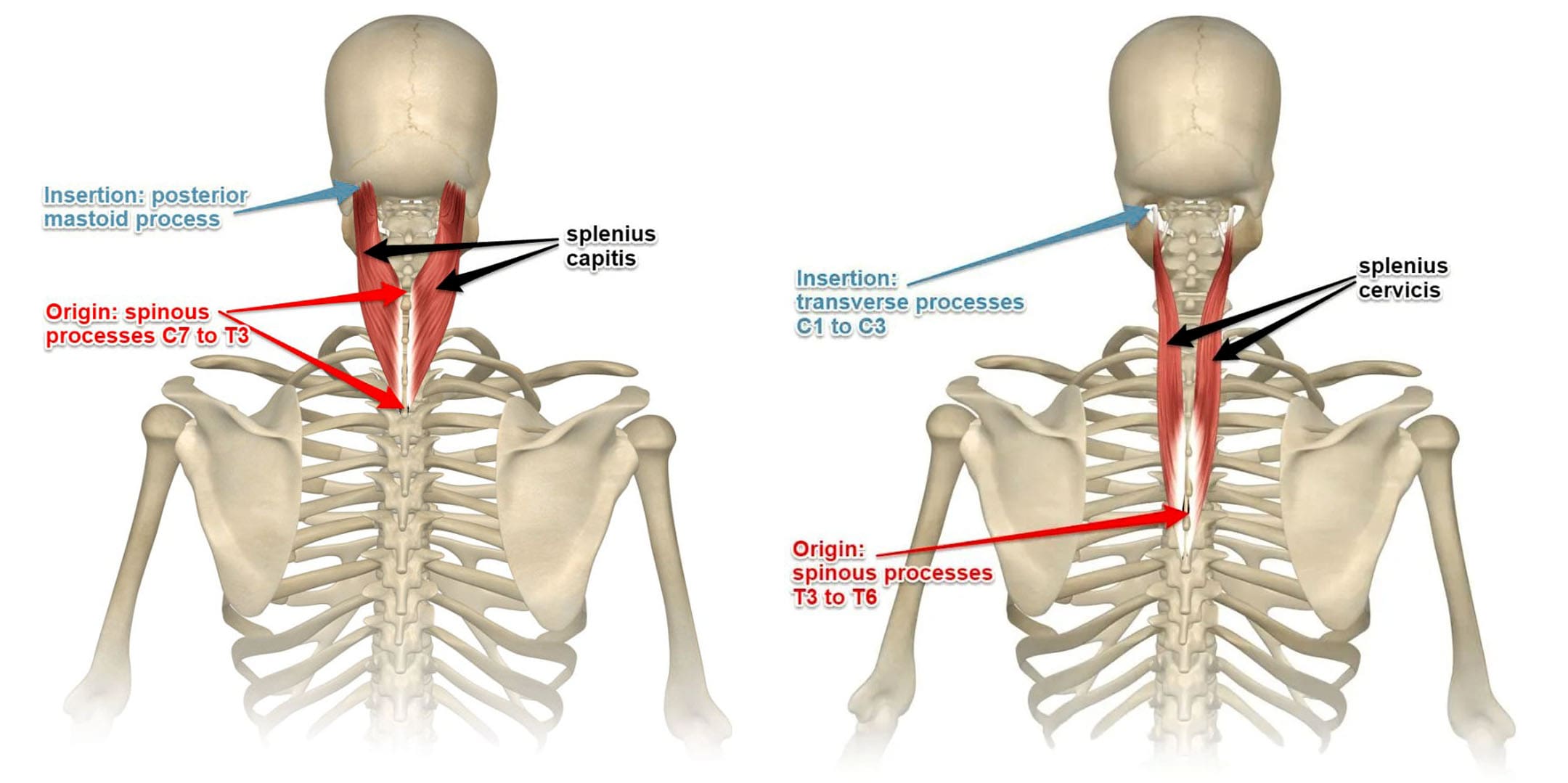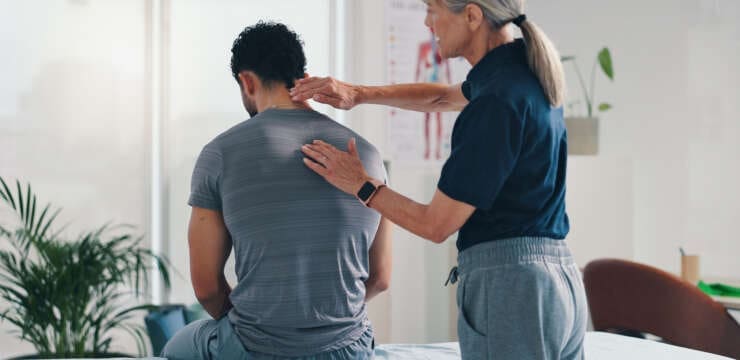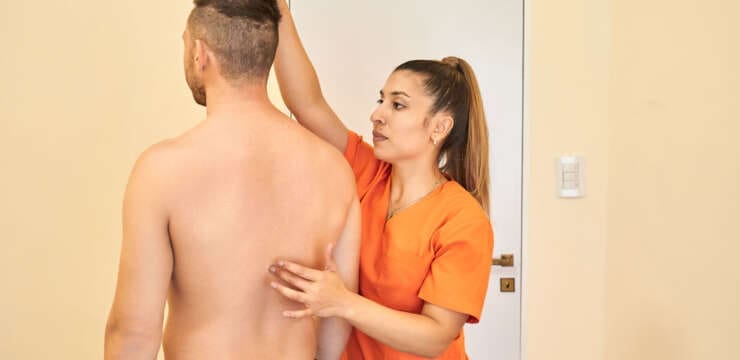
“For individuals dealing with neck or arm pain and migraine headache symptoms, it could be a splenius capitis muscle injury. Can knowing the causes and symptoms help healthcare providers develop an effective treatment plan?”

Table of Contents
Splenius Capitis Muscles
The splenius capitis is a deep muscle located on the upper back. Along with the splenius cervicis, it comprises the superficial layer – one of the three – of intrinsic back muscles. The splenius capitis works with the splenius cervicis, a smaller muscle located below it, to help rotate the neck and lower the chin to the chest, known as flexing. Maintaining a healthy posture is important because it helps keep the head in a neutral position.
- Starting at the midline of the spine at C3 to T3, the splenius capitis spans the levels between the 7th cervical vertebra to the 3rd or 4th thoracic vertebrae, which varies for different individuals.
- The muscle inserts at the nuchal ligament, which is a strong ligament of the neck.
- The splenius capitis muscle angles up and out, attaching to the skull.
- The splenius capitis and cervicis cover the vertical paraspinals, which are deeper and comprise the intermediate layer of the intrinsic back muscles.
- The splenius muscles look like a bandage for the paraspinals and the vertical muscles that comprise the deepest layer.
- The splenius muscles hold these deeper layers in the correct position.
- These muscles start at the center of the spine and together form a V shape.
- The sides of the V are thick, and the central indentation is shallow.
Pain
It’s common for individuals to experience pain associated with injury to the splenius capitis. This type of pain is known as splenius capitis syndrome. (Ernest E, Ernest M. 2011)
Symptoms
A headache stemming from injury often mimics a migraine headache. Symptoms of splenius capitis syndrome include: (Ernest E, Ernest M. 2011)
- Neck pain
- Arm pain
- Pain at the back of the head
- Headache at the temples
- Pressure behind the eye
- Pain behind, above, or under the eye
- Sensitivity to light
Causes
Injury to the splenius capitis can result from: (Ernest E, Ernest M. 2011)
- Unhealthy posture for prolonged periods
- Constantly flexing or rotating the neck
- Sleeping in awkward positions
- Falling injuries
- Automobile collision
- Sports injuries
Treatment
It’s recommended to contact a healthcare provider if experiencing symptoms that interfere with daily activities or quality of life. A healthcare provider will:
- Review the individual’s medical history
- Ask questions about the injury
- Perform a physical exam (Ernest E, Ernest M. 2011)
Treatment protocols and approaches to relieve symptoms and restore function can involve one or a combination of treatments that include:
- Ice and heat applications
- Physical therapy
- Therapeutic massage
- Chiropractic realignment
- Non-surgical decompression
- Acupuncture
- Neck stretches
- Pain medication (short-term)
- Injections
- Minimally invasive surgery
Neck Injuries
References
Ernest E, Ernest M. Practical Pain Management. (2011). Splenius Capitis Muscle Syndrome.
Disclaimers
Professional Scope of Practice *
The information herein on "Splenius Capitis Injury: Causes, Symptoms & Treatment" is not intended to replace a one-on-one relationship with a qualified health care professional or licensed physician and is not medical advice. We encourage you to make healthcare decisions based on your research and partnership with a qualified healthcare professional.
Blog Information & Scope Discussions
Welcome to El Paso's wellness blog, where Dr. Alex Jimenez, DC, FNP-C, a board-certified Family Practice Nurse Practitioner (FNP-C) and Chiropractor (DC), presents insights on how our team is dedicated to holistic healing and personalized care. Our practice aligns with evidence-based treatment protocols inspired by integrative medicine principles, similar to those found on dralexjimenez.com, focusing on restoring health naturally for patients of all ages.
Our areas of chiropractic practice include Wellness & Nutrition, Chronic Pain, Personal Injury, Auto Accident Care, Work Injuries, Back Injury, Low Back Pain, Neck Pain, Migraine Headaches, Sports Injuries, Severe Sciatica, Scoliosis, Complex Herniated Discs, Fibromyalgia, Chronic Pain, Complex Injuries, Stress Management, Functional Medicine Treatments, and in-scope care protocols.
Our information scope is limited to chiropractic, musculoskeletal, physical medicine, wellness, contributing etiological viscerosomatic disturbances within clinical presentations, associated somato-visceral reflex clinical dynamics, subluxation complexes, sensitive health issues, and functional medicine articles, topics, and discussions.
We provide and present clinical collaboration with specialists from various disciplines. Each specialist is governed by their professional scope of practice and their jurisdiction of licensure. We use functional health & wellness protocols to treat and support care for the injuries or disorders of the musculoskeletal system.
Our videos, posts, topics, subjects, and insights cover clinical matters, issues, and topics that relate to and directly or indirectly support our clinical scope of practice.*
Our office has reasonably attempted to provide supportive citations and has identified the relevant research studies or studies supporting our posts. We provide copies of supporting research studies available to regulatory boards and the public upon request.
We understand that we cover matters that require an additional explanation of how they may assist in a particular care plan or treatment protocol; therefore, to discuss the subject matter above further, please feel free to ask Dr. Alex Jimenez, DC, APRN, FNP-BC, or contact us at 915-850-0900.
We are here to help you and your family.
Blessings
Dr. Alex Jimenez DC, MSACP, APRN, FNP-BC*, CCST, IFMCP, CFMP, ATN
email: coach@elpasofunctionalmedicine.com
Licensed as a Doctor of Chiropractic (DC) in Texas & New Mexico*
Texas DC License # TX5807
New Mexico DC License # NM-DC2182
Licensed as a Registered Nurse (RN*) in Texas & Multistate
Texas RN License # 1191402
ANCC FNP-BC: Board Certified Nurse Practitioner*
Compact Status: Multi-State License: Authorized to Practice in 40 States*
Graduate with Honors: ICHS: MSN-FNP (Family Nurse Practitioner Program)
Degree Granted. Master's in Family Practice MSN Diploma (Cum Laude)
Dr. Alex Jimenez, DC, APRN, FNP-BC*, CFMP, IFMCP, ATN, CCST
My Digital Business Card






